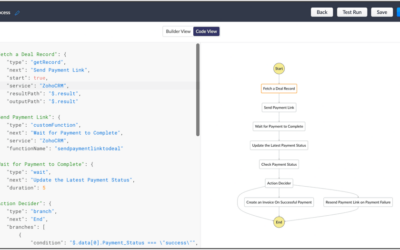Customer Relationship Management (CRM) is a term that refers to the various processes, tools, and strategies that businesses use to manage and analyze customer interactions and data throughout the customer lifecycle. CRM aims to improve customer relationships, increase customer loyalty, and drive sales growth.
One of the most popular CRM systems on the market today is Zoho CRM. This cloud-based CRM platform offers a wide range of features and integrations that help businesses streamline their sales, marketing, and customer service processes.
In this blog post, we’ll explore the benefits of CRM implementation, particularly using Zoho CRM, and we’ll provide a step-by-step guide on how to implement this platform. We’ll also discuss why customers should work with WiselyWise as their preferred Zoho CRM implementation partner.
Benefits of CRM Implementation:
- Improved customer relationships: With a CRM system in place, businesses can easily track and manage customer interactions, including phone calls, emails, and social media messages. This allows businesses to provide personalized, timely, and relevant customer service, which can improve customer satisfaction and loyalty.
- Increased sales: A CRM system can help businesses automate and optimize their sales processes, such as lead generation, qualification, and closing. This can lead to more efficient and effective sales efforts, resulting in increased sales and revenue.
- Better data management: A CRM system can help businesses store and organize customer data in a central location, making it easier to access and analyze. This can provide valuable insights into customer behavior, preferences, and needs, which can inform marketing and sales strategies.
- Enhanced collaboration: A CRM system can help teams collaborate more effectively by providing a single source of truth for customer data and activity. This can help teams stay on the same page and avoid duplication of effort.
- Greater efficiency: A CRM system can help businesses streamline and automate various processes, such as lead tracking, sales forecasting, and customer service. This can free up time and resources, allowing teams to focus on high-value activities.
Features of Zoho CRM:
- Lead management: Zoho CRM helps businesses track and manage leads from various sources, such as web forms, social media, and email campaigns.
- Contact management: Zoho CRM allows businesses to store and organize customer data, including contact information, communication history, and interactions.
- Sales forecasting: Zoho CRM provides sales forecasting tools that help businesses predict future sales based on historical data and current trends.
- Marketing automation: Zoho CRM includes marketing automation tools that help businesses create and execute targeted email campaigns, track website visitor behavior, and measure campaign effectiveness.
- Customer service: Zoho CRM offers a range of customer service tools, including a ticketing system, a knowledge base, and a customer portal.
- Integrations: Zoho CRM integrates with a wide range of applications, including email, social media, and project management tools.
Implementing Zoho CRM involves the following steps:
- Sign up for a Zoho CRM account: Go to the Zoho CRM website and sign up for a free trial or purchase a subscription plan. You’ll need to provide some basic information, such as your business name, contact details, and billing information.
- Customize your CRM: Once you’ve set up your account, you can start customizing your CRM to fit your business needs. This includes setting up users, roles, and permissions, as well as configuring your sales, marketing, and customer service processes.
- Import your data: If you have existing customer data, you can import it into Zoho CRM using the data import tool. This allows you to transfer your data from other CRM systems or spreadsheets easily.
- Integrate with other tools: Zoho CRM integrates with a wide range of applications, such as email, social media, and project management tools. You can connect these tools to your CRM to streamline your processes and automate tasks.
- Train your team: It’s important to ensure that your team is fully trained on how to use the CRM system effectively. Zoho CRM offers a variety of training resources, including documentation, tutorials, and webinars.
- Monitor and optimize: Once you’ve implemented Zoho CRM, it’s important to monitor your CRM performance and make adjustments as needed. This may include fine-tuning your processes, integrating new tools, or adding new features.
Why Customers Should Work with WiselyWise as Their Preferred Zoho CRM Implementation Partner:
- In-depth CRM knowledge: The team at WiselyWise has a deep understanding of CRM systems and how they can be used to benefit businesses. They can help customers navigate the implementation process and choose the best features and functions for their specific needs.
- Experienced team members: WiselyWise has a team of experienced professionals who have implemented CRM systems for various businesses. They have the knowledge and expertise to help customers get the most out of their CRM investment.
- Successful track record: WiselyWise has a proven track record of successful CRM implementations for a wide range of businesses. Customers can trust that they will receive the best possible service and support throughout the implementation process.
Conclusion:
Implementing a CRM system, such as Zoho CRM, can bring numerous benefits to businesses, including improved customer relationships, increased sales, better data management, enhanced collaboration, and greater efficiency. By following the steps outlined above and working with a trusted partner like WiselyWise, businesses can successfully implement Zoho CRM and start realizing these benefits.






0 Comments